| La Dama del collar | |
|---|---|
| Directed by | Luis Mottura |
| Music by | George Andreani |
Release date |
|
| Country | Argentina |
| Language | Spanish |
La Dama del collar is a 1949 Argentine film of the classical era of Argentine cinema, directed by Luis Mottura and starring Amelia Bence.
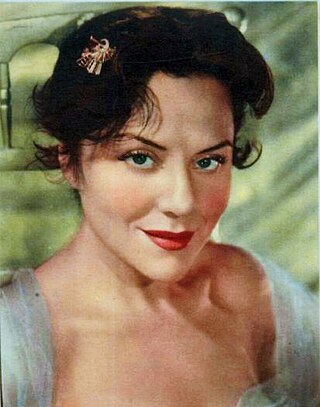
Amelia Bence was an Argentine film actress and one of the divas of the Golden Age of Argentine cinema during the 1930s and 1950s.

Mecha Ortiz was an Argentine actress who appeared in films between 1937 and 1981, during the Golden Age of Argentine cinema. At the 1944 Argentine Film Critics Association Awards, Ortiz won the Silver Condor Award for Best Actress for her performance in Safo, historia de una pasión (1943), and won it again in 1946 for her performance in El canto del cisne (1945). She was known as the Argentine Greta Garbo and for playing mysterious characters, who suffered by past misfortunes in love, mental disorders, or forbidden love. Safo, historia de una pasión was the first erotic Argentine film, though there was no nudity. She also played in the first film in which a woman struck a man and the first film with a lesbian romance. In 1981, she was awarded the Grand Prize for actresses from the National Endowment for the Arts.
![<i>Alfonsina</i> (film) 1957 [[Cinema of Argentina|Argentina]] film](https://upload.wikimedia.org/wikipedia/commons/thumb/c/c2/Amelia_Bence_and_Guillermo_Murray%2C_in_Alfonsina%2C_1957_film.jpg/320px-Amelia_Bence_and_Guillermo_Murray%2C_in_Alfonsina%2C_1957_film.jpg)
Alfonsina is a 1957 Argentine biographical film directed by Kurt Land and written by José María Fernández Unsáin. The film stars Amelia Bence as the poet Alfonsina Storni and actor Guillermo Murray.
Dance of Fire is a 1949 Argentine drama film directed by Daniel Tinayre during the classical era of Argentine cinema. It was entered into the 1951 Cannes Film Festival.
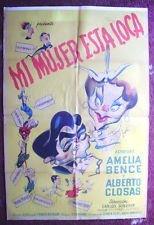
Mi mujer está loca is a 1952 Argentine romantic comedy film of the classical era of Argentine cinema, directed by Carlos Schlieper and Enrique Cahen Salaberry, and starring Amelia Bence, Alberto Closas, and Amalia Sánchez Ariño.
Dos basuras is a 1958 Argentine film. This black and white production was directed by Kurt Land and the script by Jose Maria Fernandez, Alfredo Unsain Ruanova, José María Fernández Unsain. It premiered on May 2, 1958, and starred Amelia Bence, Luis Prendes, Naomi Laserre and Luis Tasca as protagonists.

Alberto Closas Lluró was a prolific Spanish film actor who appeared in the Cinema of Argentina in the 1940s and 1950s and in Spanish cinema after 1955.
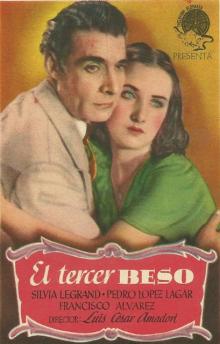
The Third Kiss is a 1942 Argentine romantic drama film of the Golden Age of Argentine cinema, directed by Luis César Amadori and starring Pedro López Lagar, Silvia Legrand and Amelia Bence. At the 1943 Argentine Film Critics Association Awards, Amelia Bence won the Silver Condor Award for Best Actress for her performance in the film.

Amanda Varela was an Argentine actress who primarily worked during the Golden Age of Argentine Cinema, performing on stage and in films of Argentina and the US. She made 9 films in Argentina and 2 in the US and appeared on stage in numerous productions in both countries. Varela is usually credited with helping her sister, Mecha Ortiz, secure her first acting roles. In the 1950s, Varela retired from acting, moved to the United States, and became a matrimonial judge.
Paulina Singerman Begun was an Argentine actress and businesswoman who primarily worked during the Golden Age of Argentine cinema, performing on both stage and in films. In the later part of her career, she spent a decade performing for television. She was the younger sister of actress Berta Singerman. In 1981, she was awarded both a Diploma of Merit and a Platinum Konex for her comedy work in film and theatre.

La fuga is a 1937 Argentine drama film directed by Luis Saslavsky and starring Santiago Arrieta.
The Sin of Julia is a 1946 Argentine melodrama film of the classical era of Argentine cinema, directed by Mario Soffici and starring Amelia Bence, Aída Luz and Alberto Closas.
Seven Women is a 1953 Mexican drama film directed by Juan Bustillo Oro and starring Amelia Bence, Alma Rosa Aguirre and Bárbara Gil. It is based on a play of the same name which had previously been adapted into the 1944 Argentine film Seven Women.
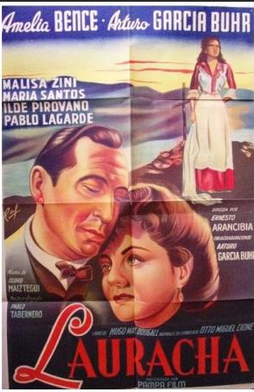
Lauracha is a 1946 Argentine melodrama film of the classical era of Argentine cinema, directed by Arturo García Buhr, Ernesto Arancibia, Antonio Ber Ciani and Enrique Cahen Salaberry, and starring Amelia Bence and García Buhr. The film was adapted for the screen by Hugo Mac Dougall, based on the Uruguayan novel of the same name by Otto Miguel Cione, which was originally published in 1906.
Osvaldo Cattone was an Argentine actor who lived for over three decades in Peru and was considered one of the pioneer theater directors and actors of Peru.
Roberto Fernández Beyró (1909–1991) was an Argentine journalist, restaurateur, and food critic who wrote a regular column in La Nación critiquing the lack of gastronomic traditions in Argentina. He was a member of several gourmet food clubs and wrote a cookbook of simple, traditional recipes.
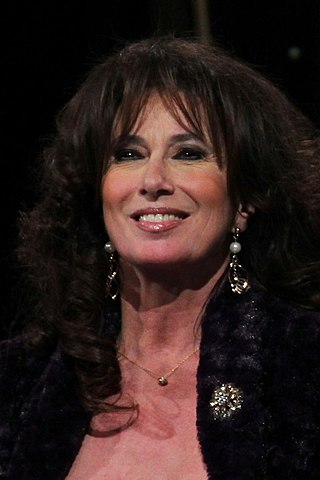
Luisa Kuliok is an Argentine actress of theater, film and television.
Pampa Film was an Argentine film production company that was active during the Golden Age of Argentine cinema in the 1930s and 1940s. It is known for its classic Prisioneros de la tierra (1939).

Estudios San Miguel was an Argentine film studio that was active in the 1940s and early 1950s. It flourished during the Golden Age of Argentine cinema, and at its peak was one of the major studios in Buenos Aires. Genres ranged from musical comedy to costume drama and gaucho thriller. Films included La guerra gaucha, co-produced with Artistas Argentinos Asociados, and the comedy Juvenilia (1943), both of which won several major awards. Eva Duarte, soon to become the first lady of Argentina as Eva Perón, appeared in two of the studio's films in 1945. The studio became overextended financially and ceased production after 1952.